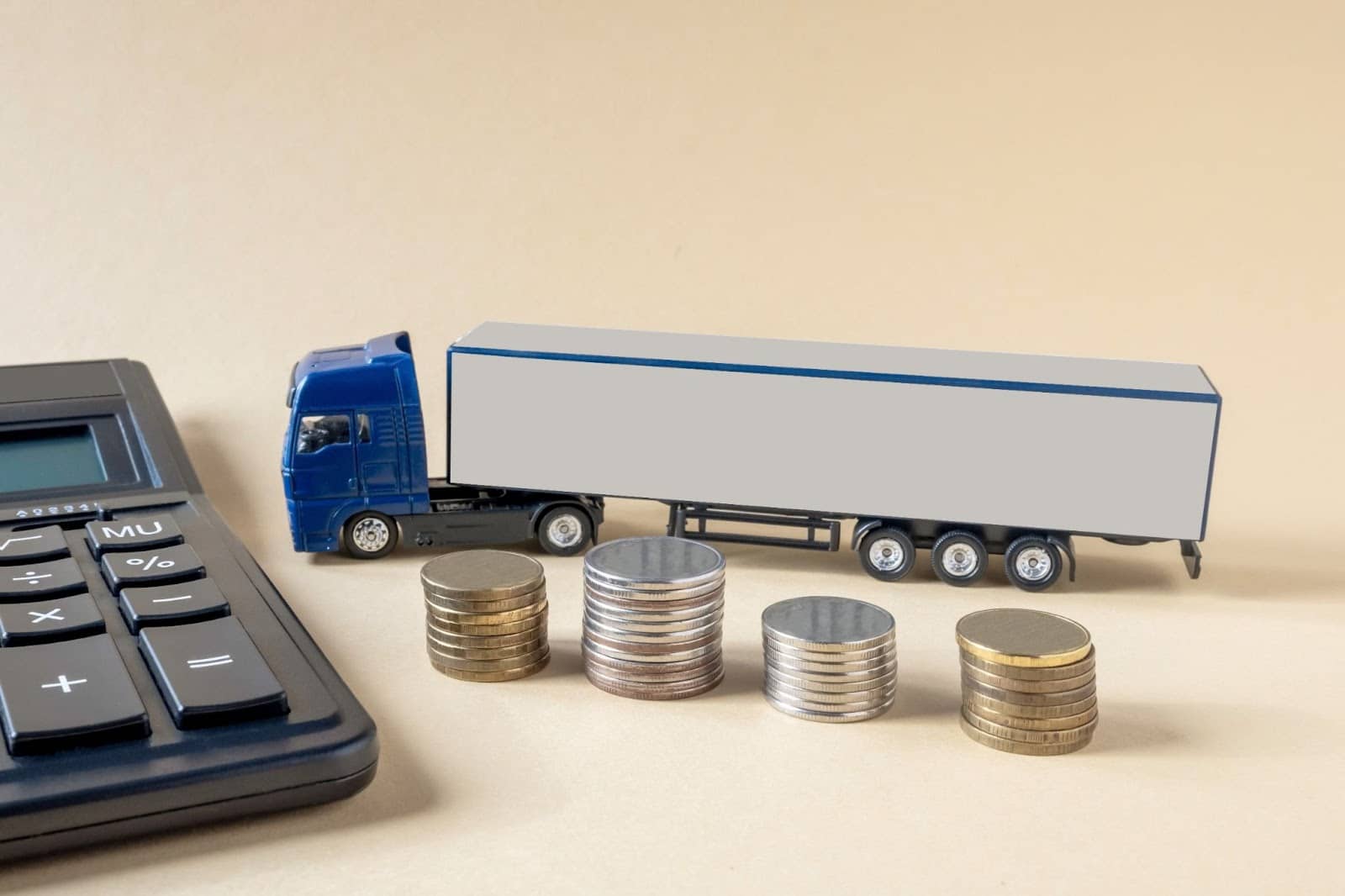What You Need to Know About Trucking Business Loans
Trucking companies tend to have a lot of business expenses. You need to buy a lot more than just the semis.
For instance, you’ll need to pay for permits, tolls, gas, payroll, maintenance, taxes, and insurance.
Trucking business loans can help you cover these expenses as you build your company and during times of low cash flow.
This article will dive into every aspect of trucking business loans, including what to look for in a lender and financing alternatives.
Why Get a Trucking Business Loan?
As a small business owner, there are times you have to take a step back to take two steps forward. While no one likes going into debt, a small business loan provides the working capital you need to grow your business.
Here are a few very viable reasons to secure a trucking business loan:
Keep Your Fleet on the Road
If you are struggling to keep your fleet on the road due to a lack of cash flow, a business loan can save the day.
This loan could help to pay for any repairs and maintenance on your semis to keep them running efficiently.
You could also use it to fill up their gas tanks so your truckers can make their deliveries.
(I’m sure you don’t need to be reminded of the high cost of diesel.)
Of course, you also need to cover payroll. It’s crucial to pay your truck drivers on time and in full for their work.
Remain in Compliance With State and Federal Regulations
It’s imperative to pay your taxes and government fees on time to stay in compliance with the law. Unfortunately, these seemingly procedural expenses can feel like insurmountable obstacles when you’re tight on money.
A trucking business loan can help you pay these fees as soon as they are due.
This extra cash can also go toward insurance and registration expenses. You can use your loan money to cover monthly payments or yearly registration fees for your semi-trucks.
Grow Your Business
You may be at the point where you’ve achieved every goal on your original business plan and are looking to expand.
Small business loans provide the working capital you need to jumpstart your expansion. You can use this capital to hire more drivers, purchase new trucks, or expand your garage.
Even if you choose to work with owner-operators, you can still widen your client base by putting some of this extra cash toward marketing.
You might also spend your loan money on new equipment.
Technology is an ever-evolving beast that we all need to keep up with. In the trucking industry, updates come in the form of new logistics equipment, which is always a hefty investment.
Access to working capital allows you to jump on growth opportunities that you might not be able to otherwise.
Read about other ways to grow your trucking business here.
Tip: Taking out loans is not always the best way to secure money for your business. Keep reading to learn about some other options, or check out our alternative financing solution.
How to Find the Best Loan for Your Trucking Business
Before starting your loan search, you have to make an important decision:
Do you want a small business loan or an equipment financing loan?
Not sure which is best for your situation?
Here’s a breakdown of each loan option:
Small Business Loan
These loans are usually for larger sums of money and can be used for anything from equipment to marketing to payroll.
This option will require a down payment, and the rates are determined by the value of your business and credit history. These loans are long-term loans that you will pay on for years to come.
Equipment Financing
Equipment loans are used for truck financing and other equipment purchases.
The exact loan amount depends on the equipment’s cost (you may need to bring a quote from your equipment vendor to get approved for the loan).
The equipment itself serves as collateral for the loan, which is usually easier to obtain than a small business loan.
How Big of a Loan Do You Need?
Here’s an important question you should answer before you start talking to loan agents about financing options:
How much money are you hoping to get?
The size of your loan can greatly affect your loan specs. Larger loans usually come with longer repayment terms, while smaller loans are usually processed much faster.
So, how do you figure out how much money you want to borrow?
You gotta crunch the numbers.
For truck financing, this process is simple. You know the cost of the semi-truck you want to purchase, and you need that much money.
For a business loan, determine the minimum amount needed to cover your desired expenses, and then add a little cushion.
The goal is to find your Goldilocks number: too high and you may not be able to pay it back as the interest accumulates; too low and you won’t be able to cover your expenses.
Nerdwallet has a handy business loan calculator that you can use to help you figure out exactly how much money to ask for.
Are You Eligible for a Loan?
Another question to answer is how much money you are eligible to borrow.
Your personal credit score and business credit score both impact your borrowing power.
You are probably very aware of your personal credit score, but how about that business score?
Your business credit score is the one that carries more weight when you apply for this loan since the business will ideally pay it back.
If this is the first business loan you’ve applied for, you may not even be aware of what or how a business credit score works.
Nav has a very comprehensive article that covers all you need to know about business credit scores. It even includes some pointers on how to improve yours if your business has bad credit.
Aside from credit scores, lenders look at three things to determine your eligibility:
- Length of doing business
- Yearly revenue
- Down payment
Let’s discuss each of these factors.
Length of Doing Business
Most lenders prefer that your business has been established for over a year. The longer you’ve been in business, the better your chances of getting the loan.
By keeping your business up and running, you prove your viability and show lenders that you’re a minimal risk.
Yearly Revenue
Your company’s annual revenue proves your ability to turn the profit needed to repay the loan.
Lenders like to see healthy numbers here.
Down Payment
Most lenders will require that you put down 5-25% of the loan amount.
The more you put down, the better the interest rate. You can still receive a loan if you don’t have much money to put down, but it will likely have higher interest rates.
What to Look For in a Lender
Measuring up to lenders’ standards is an important part of the loan process. However, you also need to compare lenders to see how they measure up to your business needs.
Your business is valuable, and you want to work with a reputable lender.
When choosing a lender, you should consider which type would be best for your needs, then compare their rates.
Types of Lenders
There are three main types of financing institutions that grant business financing. Each has its own unique set of pros and cons.
Let’s compare them:
Online Lenders
Online lenders tend to have an easy application process with a quick turnaround.
However, these benefits come with one very big caveat: their loans usually carry a higher interest rate and more hidden fees.
Banks and Credit Unions
Traditional lenders, such as banks and credit unions, definitely have a more strict application process.
However, they can offer better rates and terms for your loan.
The approval process has a decent turnaround time, with you getting your much-needed cash in a timely manner.
Loans from brick-and-mortar banks often require more collateral and a higher down payment.
The Small Business Administration
The best loan in terms of interest rate and down payments are from the U.S. Small Business Administration.
This federally funded loan program offers three different types of loans:
The most popular is their 7(a) loan, which provides businesses capital without any limit on how they can use the money.
They also offer 504 loans, which must be used for real estate or machinery, and microloans which are loans of $50,000 or less for startups or growing businesses.
As already stated, SBA loans offer lower interest rates and longer terms than traditional loans. They also require a lower down payment and little-to-no collateral.
This type of loan has the longest turnaround period of all funding options. It can take up to three months to close the loan application, and the paperwork is exhausting.
If you need money fast, this isn’t the loan for you. If you can wait, it is worth it.
Trying to Choose a Lender? Ask Yourself These Questions
You should always apply to more than one lender to get the best deal. As you compare loans from various lenders, you’ll want to go through this checklist of questions:
- Amount: Does it cover your needs?
- Interest Rate: Will you be able to keep up with interest payments?
- Term Length: The longer the term, the smaller the payments.
Trucking Business Loan Alternatives
Near the beginning of this article, we mentioned that a trucking loan might not be the best option for securing business funding.
Here are a few other ways for a trucking business to increase its cash flow:
Invoice or Freight Factoring
Did you know that you can sell your unpaid invoices to an invoice factoring company?
Instead of waiting on your clients to pay, which sometimes takes longer than necessary, freight factoring pays you for your load as soon as it’s delivered.
The factoring company will take a small fee for providing this service to you, but this can be a good solution if you struggle to make ends meet between loans.
This option allows you to increase your cash flow without going into debt, which is the goal of every business.
Read our article on how freight factoring works here.
For a unique solution in invoice factoring, check out NowAccount, our accelerated invoice payment system, to learn how we can help you secure working capital for your business.
Grants
Our economy depends on a healthy flow of distribution and transportation of goods. The federal government maintains a few grant programs to keep transportation companies in business.
While no company is guaranteed to receive these grants, you never have to pay them back. Free money is the best kind!
Here are three grants for which trucking companies can apply:
You can learn more about the viability of grants as a loan alternative in this article on our blog: Are Grants Always Better Than Loans?
Business Line of Credit
A business line of credit is a reserve of money that you can draw from as needed. This credit line works similar to a business credit card and is great for emergencies.
With a business LOC, you only pay for the withdrawals you make.
In other words, you don’t have to use all of the money if you don’t need it. This helps to keep interest fees low.
Fuel Cards
Many transportation companies enjoy the conveniences offered by a fuel card.
You can pay for fuel and sometimes even the maintenance of your trucks with these cards.
Many fuel cards provide a discount on gasoline, too, which is a big plus for trucking companies that use hundreds of gallons per day.
No two cards are the same. You’ll want to check the fine print before choosing which to use.
Look for any annual fee, offers, or rewards. Research the coverage network too, so you know where you can use your card.
This article breaks down the most popular fuel cards for truckers to help you choose the best one for your business.
See also: How to Recover Lost Revenue with a Freight Bill Audit
A small business loan could help you grow your trucking business, but it’s important to know that it isn’t the only option out there.
Grants, lines of credit, invoice factoring, invoice acceleration, and even private investment are on the table.
Before choosing your funding route, consider the impact it could have on your business in the future.
Without a doubt, this is a big decision for trucking business owners and shouldn’t be taken lightly.
Give us a call, and we can help you NOW.






